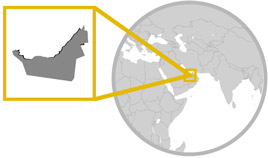|
Wording
|
Phonetic
|
English
|
| Salam | Sah-lam | Hello/Hi |
| Ma a salama | Mah ah sah-lah-mah | Good Bye! |
| Hal tatakallamo alloghah al Enjileziah / Alarabiah? | Hahl tah-tah-kah-lah-moh ahl-oh-gah ahl Ehn-jill-ehz-ee-ah / Ah-lah-rah-bee-ah | Do you speak English / Arabic? |
| Esmee… | Ehz-mee | My name is… |
| Hal beemkanek mosa’adati | Hahl beam-kah-nehk moh-sah-ah-dah-tee | Can you help me? |
| Abhatu an… | Ahb-hah-too ahn | I’m looking for… |
| Na’am / Laa | Nah-ahm / Lah | Yes / No |
| Assayed / Assayedah / Al Anesah | Ah-say-ehd / Ah-say-ehd-ah / Ahl Ah-ney-sah | Mr / Mrs / Miss |
| Alyawm / Al aan | Ahl-yorm / Ahl Ahn | Today / Now |
| Ghadan / Albareha | Gah-dahn / Ahl-bah-reh-ah | Tomorrow / Yesterday |
| Haza / Zalek / Huna / Hunak | Hah-zah / Zah-lek / Hoo-nah / Hoo-nahk | This / That / Here / There |
Languages
Although Arabic is the official language of the country, Balochi, a Northwestern Iranian language, is also very widely spoken, especially by the Baloch people. Lesser spoken native languages in the country include Bathari (a Semitic language), Mehri (a Southern Arabian language), Hobyot (another Semetic language also spoken in Yemen), Harsusi (a Semetic language similar to Mehri), Kumzari (a Southwestern Iranian language) and Shehri (or Jibbali, a Modern South Arabian language).
Additionally, both English and Swahili are spoken throughout the country with nearly all signs and writing appearing in both Arabic and English. Urdu is also spoken significantly and schools have recently started teaching German.

